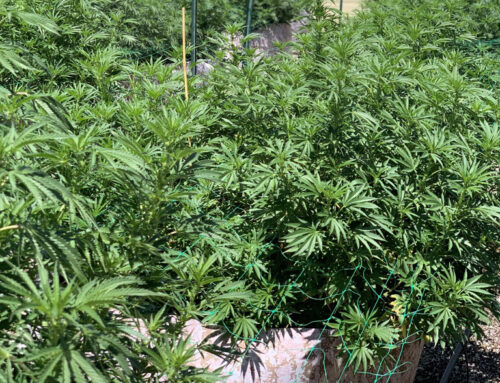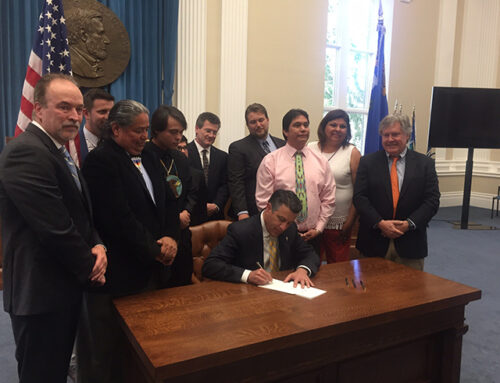Original Article: http://www.elynews.com/2017/09/08/nevada-tribes-enter-compact-enter-marijuana-business/
Special to The Ely Times
Nevada tribes are getting into the marijuana industry by following a successful model from a nearby state.
The Ely Shoshone Tribe and the Yerington Paiute Tribes are the first to enter into marijuana compacts in the state, a consultant group announced.
The agreements were made possible under Senate Bill 375, which Gov. Brian Sandoval signed the bill into law on June 2.
At the time, his office said the measure was “supported by all of Nevada’s 27 tribes and will present economic development opportunities for these communities.”
Senate Bill 375 recognizes the authority of tribes to grow, sell and market marijuana in a state where the drug is legal for medicinal and recreational purposes.
Compacts, while not necessary, are encouraged to address law enforcement, jurisdiction and other issues.
A similar model first emerged in Washington in 2015. Since then, a handful of tribes have successfully entered the marijuana market drawing the interest of several more. This makes a big difference from other states, where tribes faced raids or were threatened by state and federal authorities.
“We quickly learned that no one tribe is the same as another. They each have very unique values, histories, and membership that reflect the opportunities they have or don’t have with the cannabis industry,” said Cassandra Dittus, a co-founder and president of Tribal Cannabis Consulting firm.
Nevada tribal communities are particularly challenged in building sustainable economies. Most of the state’s tribes are in remote locations such as Ely,
The tribe owns only one truck stop, and other economic opportunities are very limited. The largest employer in the region is copper, gold and molybhenum mines.
“This is really going to help us provide economic development to our tribe and services to our small community,” said Ely Shoshone Tribal Council Member Diana Buckner. “The governor has worked with us on the legislation, and we commend him for working with tribes.”
Dittus said that the tribes she partners with are more focused on medical marijuana than recreational, although state voters approved the Nevada Marijuana Legalization Initiative in November 2016 to open the state to both uses.
During the three-year process, “The tribes adopted regulatory codes that let them issue marijuana cards,” said Dittus. “Those cards are also accepted for reciprocity with the state of Nevada.”
Bill Brothers is president of Phoenix-based firm Arizona Facilities Supply, the largest consultation firm specializing in medical marijuana cultivation, research, facility management and software development in Arizona and Maryland. Brothers said it’s important that a tribe entering the cannabis industry work within certain strictures.
Unlike Nevada, Brothers says that not all states have developed protocols for tribal and state reciprocity in issuing user cards.
For example, “Arizona and Maryland allow medical usage,” he said. “But Nevada allows for both medical and adult, or recreational, use and possession by anybody age 21 and over.”
Brothers suggests the Nevada tribes should be in the clear, since Drug Enforcement Administration raids on tribal cannabis growers were in states where the particular tribes were not complying with state law.
There are also practical factors to consider when embarking on a medical marijuana operation: “People need to be aware that marijuana growing is not easy,” Brothers said. “Mold, mildew and bacterial pests are prevalent. It takes solid expertise to grow it commercially. There is no guaranteed success.” In fact, he knows of two operations that failed completely to raise viable crops.
But even with regulatory hoops to jump and the technical issues associated with commercial cultivation, more tribal communities are considering entering the market for cannabis products.
“We have coalitions [such as the National Indian Cannabis Coalition] with the common goal of economic development,” Dittus said. But, despite the change in state law, marijuana remains illegal under federal law and, by extension, in Indian Country.
A Department of Justice policy that was issued during the Obama administration seemed to recognize the ability of tribes to legalize the drug on their own yet Washington so far has been the only state where operations have begun without problems.
The Trump administration has not rescinded the policy but Attorney General Jeff Session the new head of the department, has vowed to take a harder stance against marijuana.


